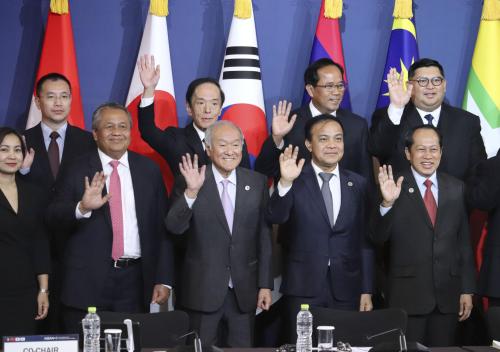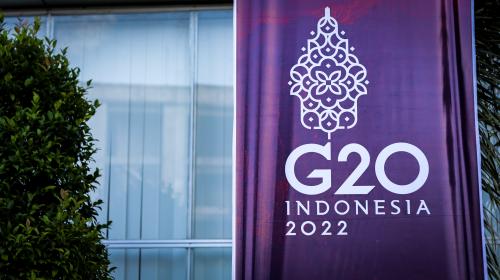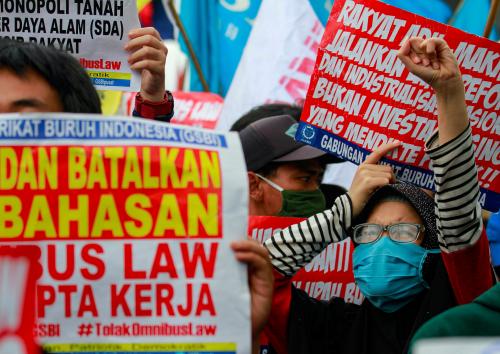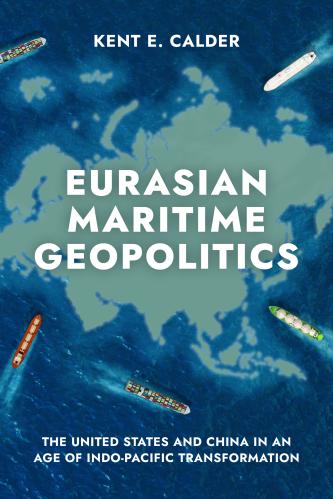The year 2024 will mark Indonesia’s sixth round of legislative elections in the country’s democratic era. This will also be the fifth consecutive election in which Indonesians vote in direct presidential elections (the 1999 presidential election was indirect), giving the Indonesian public a voice in choosing who will hold the highest political office in the world’s fourth-most populous country.
These are auspicious indicators of the durability of Indonesia’s electoral democracy. However, a closer look at Indonesia’s presidential politics reveals serious concerns about the country’s constitutional order, the rule of law, and the quality of its decades-old democracy.
Indonesia’s fractionalized democracy
Under Indonesia’s multiparty presidential system, legislative elections are highly fractionalized, with the largest legislative parties normally receiving about one-fifth of the seats in the country’s House of Representatives (Dewan Perwakilan Rakyat, DPR). Indonesia’s largest legislative party, the Indonesian Democratic Party of Struggle (PDI-P) , holds 22% of the seats in the current DPR.
To govern effectively with such a fragmented legislature, the president must assemble a governing coalition out of at least three legislative parties. Since 1999, Indonesian politics have been characterized by increasingly large and oversized legislative coalitions. In the words of one influential analyst, these coalitions function as cartels rather than regular legislative coalitions. In a “regular” legislative coalition, parties strive to limit the number of parties in government to maximize the benefits they receive for being in the coalition. The “cartel” logic is different: to add as many parties to the governing coalition as possible to eliminate as much legislative opposition as possible.
Because Indonesia’s legislative parties are small relative to the governing coalition’s size, presidential leadership in Indonesia is even more important than in other presidential systems. Although no one doubts that larger legislative parties in Indonesia have more political power than smaller ones, electoral politics at the national level is about control of the presidency.
Jokowi looms large over Indonesia’s election
The incumbent president, Joko Widodo (known as Jokowi), remains immensely popular — but he is term-limited. In the past two presidential elections, his opponent was Prabowo Subianto, a former general and former son-in-law of Suharto, who ruled Indonesia as president under the authoritarian New Order regime from 1966-1998. Jokowi’s two presidential campaigns emphasized a pluralist form of Indonesian nationalism that emphasized effective governance, morality in politics, and social and economic development. Prabowo, drawing on his military record, campaigned on law-and-order themes and opportunistically drew support from the country’s hardline Islamist elements (although Indonesia is a multireligious state, 88% of its population is Muslim).
Jokowi decisively defeated Prabowo in both the 2014 and 2019 elections. Especially after the 2014 campaign, many analysts expressed relief that Jokowi’s progressivism and pluralism had defeated the religious identitarianism and strongman politics of the Prabowo campaign. Many saw Prabowo as a direct threat to Indonesian democracy: In addition to being famous for his temper and his family’s corruption, he was complicit in several high-profile human rights violations during his time as a military officer, from massacres during Indonesia’s occupation of Timor-Leste to the disappearance of pro-democracy protesters and anti-Chinese violence in 1998.
In the 2024 presidential race, Prabowo is once again a contender. His opponents are Anies Baswedan, the former governor of Jakarta who is viewed as a voice for modernist (i.e., conservative) Muslim elements in Indonesian politics, and Ganjar Pranowo, the former governor of Central Java who is attempting to follow Jokowi in embracing a progressive, pluralist, developmentalist vision for Indonesian democracy.
Especially since Ganjar is running as a candidate with the PDI-P (Jokowi’s party), one might imagine that the current president’s legacy would be secure if Ganjar is elected. But owing to his desire to see big developmental projects (like the country’s plan for a new capital city, Nusantara, in eastern Borneo) through to their completion, Jokowi has thrown his support behind Prabowo, who has served as his minister of defense since 2019. This is not only a signal of just how wide and encompassing Indonesia’s governing coalitions have become but also evidence of Jokowi’s willingness to embrace illiberal elements when they benefit him politically.
Scholars of Indonesian democracy have termed Jokowi’s efforts to disrupt opposition party organization and restrict media and internet criticism a strategy of “fighting illiberalism with illiberalism.” As a result, democratic backsliding in Indonesia is emerging from an unlikely source: a very popular and effective president who can truthfully boast of his achievements in infrastructure, economic development, and social stability.
Indonesia’s democratic decline
Indonesia’s democratic decline under Jokowi has been years in the making. Yet recent events have focused attention on the legal and constitutional foundations of Indonesian democracy. The immediate concern is a landmark October ruling by Indonesia’s Constitutional Court that controversially held that Gibran Rakabuming Raka, Jokowi’s elder son, was eligible to run for vice president on Prabowo’s ticket.
Gibran is 36 years old, and according to Indonesia’s 2017 election law (enacted under his father’s first administration), the minimum legal age for presidential and vice presidential candidates is 40. Rather than following established law and ruling Gibran ineligible to run for vice president, however, the Constitutional Court — led by Anwar Usman, who happens to be married to Jokowi’s sister — ruled that Gibran’s experience as the current mayor of Surakarta made him eligible for the vice presidency. There is no apparent legal foundation, or any precedent, for this ruling.
The Constitutional Court’s ruling stunned Indonesians and foreign observers alike. Despite the public outcry, various legal challenges, and a public rebuke and the demotion of Anwar by the Constitutional Court’s own ethics council, the Prabowo-Gibran ticket will contest in the 2024 presidential race. In fact, the Prabowo-Gibran ticket leads the other two tickets — Anies with Muhaimin Iskandar, and Ganjar with Mahfud MD — in pre-election public opinion polling.
What to look out for in 2024
Looking ahead, then, there are two main things to watch for as the February 2024 election results roll in. One is the partisan composition of the elected DPR. Although the pattern in Indonesian politics suggests that most parties will eventually join whatever governing coalition forms, Gamson’s Law still seems to apply: the bigger the party faction, the more power it will get. PDI-P has been the largest party for some time, but it now faces a divide between its most prominent current electoral candidate (Ganjar) and its most popular elected official (Jokowi). A poor legislative showing for a divided PDI-P would give other parties room to flex their political muscles. A more fragmented legislative coalition would only heighten the power of the executive branch to set the legislative agenda.
But all eyes will be on the results of the presidential contest. Under Indonesian law, a presidential ticket needs a majority of the votes cast to be elected. If no ticket wins 50% of the votes, the top two finishers will participate in a run-off election to be held in June 2024. Jokowi’s support for his son Gibran and his erstwhile opponent Prabowo has given their ticket enough of a boost that they are almost certain to finish among the top two. The short-term question is whether Prabowo and Gibran can win the election outright in the first round.
Moreover, the long-term question is whether the Constitutional Court and presidential politics have done irreparable damage to Indonesia’s democracy. Although Indonesia does not face an acute threat of a coup, an autogolpe, or the suspension of democracy, the country faces a crisis of confidence in the rule of law. For many Indonesians, as for many foreign observers, this is nothing new. But the elite politicking of the 2024 presidential election has brought the fragility of Indonesia’s constitutional order to light once again.
The Brookings Institution is committed to quality, independence, and impact.
We are supported by a diverse array of funders. In line with our values and policies, each Brookings publication represents the sole views of its author(s).







Commentary
Indonesia’s election reveals its democratic challenges
January 12, 2024